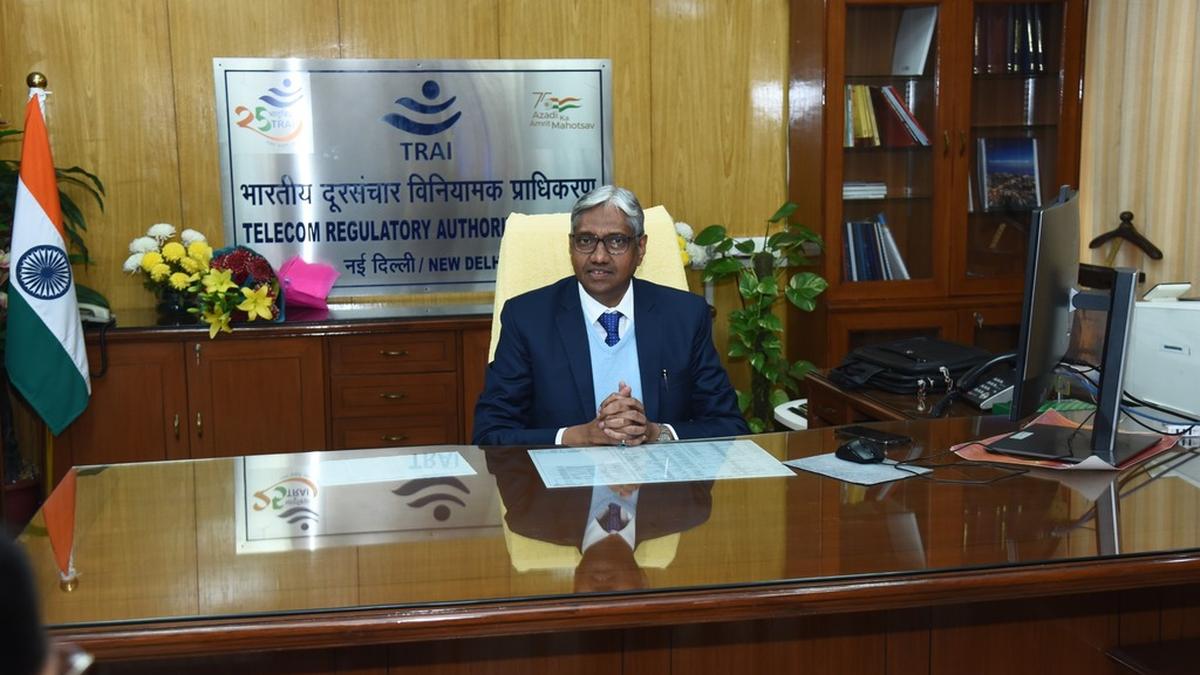TRAI rejected satellite internet as a competitive or equivalent threat to “terrestrial” mobile and fixed line networks and TRAI chairperson Anil Kumar Lahoti said, “It’s a complementary service.” File
| Photo Credit: trai.gov.in
The Telecom Regulatory Authority of India (TRAI) on Friday (May 9, 2025) recommended that fixed satellite services by firms like Starlink should pay 4% spectrum usage fees on their adjusted gross revenues, as well as a ₹500 annual fee per urban subscriber. The recommendations bring India a step closer to accessing satellite internet services like the one provided by Elon Musk-owned Starlink.
TRAI rejected satellite internet as a competitive or equivalent threat to “terrestrial” mobile and fixed line networks, reasoning that the total bandwidth available on satellite networks was far lower, and that spectrum could be shared among satellite providers. “It’s a complementary service,” TRAI chairperson Anil Kumar Lahoti said. “There is no sound basis to examine this issue in the context of competition.”
The recommendations, which have been under consideration since last year, come just two days after the Department of Telecommunications (DoT) issued a letter of intent to Starlink, which has been eyeing the Indian market. Starlink now needs to acquire spectrum under the terms that TRAI has now recommended, with fees of ₹3,500 per megahertz of spectrum it intends to use. (Assuming Starlink maxes out at 200 megahertz, as it does in some other countries, this will be an annual expense of ₹70 lakh.)
The United States has been pressing countries around the world to pave the way for services like Starlink as a part of overall trade talks. Mr. Lahoti said that this was not a factor in the regulator’s recommendations today. “We have dealt with the entire subject only in the context of the reference received (from the DoT),” Mr. Lahoti said. “If there are any issues with respect to the bilateral trade agreement, etc, those are dealt with by the government, not by TRAI.”
The spectrum assignment will only last for five years, extendable by two years. Starlink had asked for a minimum 15 year validity of spectrum. An authorisation fee of 8% will also apply, as it does to telecom operators and fixed line internet providers. These fees and surcharges are likely to make Starlink services cost significantly more than ₹4,200, which is the price in Bhutan, whose local currency is pegged to India’s at parity.
TRAI has recommended that spectrum in multiple bands in the 12–75GHz range.
Security conditions were not a part of TRAI’s recommendations, as those are handled by the DoT. Earlier this week, DoT added a few security conditions to its existing stringent framework, prescribing restrictions on satellite internet terminals that would disable them outside Indian soil. The DoT will now review TRAI’s recommendations, and if it differs on any aspect, will send a back-reference to the regulator, after which the government can proceed with spectrum administration.
Published – May 09, 2025 07:21 pm IST
#TRAI #recommends #fees #framework #satellite #internet #services
Telecom Regulatory Authority of India,satellite internet services ,TRAI chairperson Anil Kumar Lahoti
latest news today, news today, breaking news, latest news today, english news, internet news, top news, oxbig, oxbig news, oxbig news network, oxbig news today, news by oxbig, oxbig media, oxbig network, oxbig news media
HINDI NEWS
News Source



